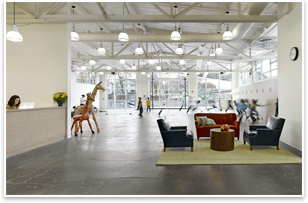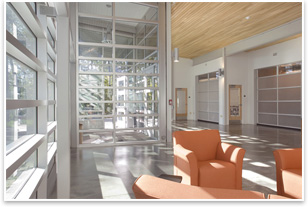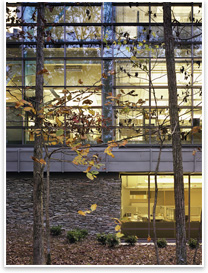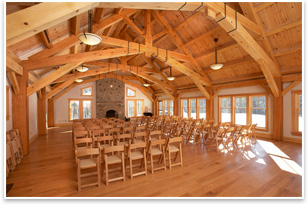| AIA New Hamsphire’s Integrated Design/Integrated Development Conference Honors Four Projects for Sustainable Design
Summary: The four winners of the fourth annual Integrated Design/Integrated Development (IDID) Excellence in Sustainable Design and Development Awards program were announced last month at the fifth IDID Conference held at Plymouth State University, Plymouth, N.H. Projects were honored for “demonstrating excellence in design, a substantive engagement of sustainable design principles, and the beneficial synthesis of an integrated approach to site planning, site and building design, and construction.” All architects in the New England region were eligible to enter any project in the world, and architects outside the region could submit projects located in New England. The awards program is conducted by the NH Environmental Guild, a committee of AIA New Hampshire.
Honor Award
 Project: The Atrium School Project: The Atrium School
Location: Watertown, Mass.
Architect: Maryann Thompson Architects
The project entailed reuse and reprogramming of a deteriorated warehouse and the greening of a contaminated site. The school‘s message about conservation and recycling extended to sustaining the neighborhood by investing in the property and in the transitioning neighborhood. The project is also sustainable from the perspective of its relatively low cost. At $110 per square foot, the cost of renovating and adapting the building was substantially lower than a completely new design. The design also demonstrates sustainable values through its modest and efficient interiors. It integrates with the site by reintroducing green spaces and pervious surfaces to encourage local wildlife and native plants, while providing students with park-like outdoor play areas. Jurors noted that this is a "great project … an excellent example of how building reuse, attractive design, and sustainable building strategies can come together."
Photo © Anton Grassl/Esto.
Merit Awards
 Project: The Foster Student Innovation Center Project: The Foster Student Innovation Center
Location: University of Maine, Orono
Architect: Oak Point Associates
The architects designed this student center to reflect the surrounding environment through use of natural stone, reflective glass, and a band of copper that suggests the color of oak leaves in the fall. Oak Point Associates' design team and the University of Maine's building committee worked together to integrate university-developed technology and educational programming in the design and construction process. The project minimized site disturbance and used local materials. Windows were designed and engineered to provide the multiple benefits of daylight, passive solar heating, summer heat-gain avoidance, ventilation, and a visual connection with the surrounding natural environment. Jurors commended the design team for its efforts to integrate the end users in the design project, as well as for its innovative roof systems and a real-world testing opportunity for the continued development of green technologies.
Photo © Kim Roseberry, Oak Point Associates.
 Project: The CarMax Home Office Project: The CarMax Home Office
Location: Richmond, Va.
Architect: ADD Inc.
The owner began the design process by bringing in a sustainable design consultant before the architects and consultants were selected, allowing the like-minded team to prioritize green design objectives. The project minimized site clearing and incorporated a pedestrian bridge to avoid re-grading. The building uses low-flow faucets; toilets, and showerheads. Indigenous plantings are used on the site to drastically reduce irrigation. The project exceeds LEED® benchmarks for the amount of recycled and locally manufactured materials. To reduce energy further, the building uses photo-sensors, occupancy sensors, carbon dioxide sensors, and highly efficient fluorescent and metal halide lighting. Over 95 percent of the building's occupants have access to daylight and views. Jurors commented: "It is easy to miss the subtlety of both the technical and design responses, but their merit is clearly apparent. This is a great model of what greening a contemporary office building can look like."
Photo © Anton Prakash Patel.
Honorable Mention
 Project: The Tin Mountain Conservation Center Project: The Tin Mountain Conservation Center
Location: Albany, N.H.
Architect: Christopher P. Williams Architects
This nonprofit nature center focused on teaching surrounding communities about ecological issues, such as what people can do to make houses and non-residential projects energy-efficient and less dependent on importing utilities. All subcontractors worked on the hiker's principle of "carry in, carry out" with regard to construction waste. Sustainable elements include low-flow water fixtures, locally harvested building materials, a radiant floor heating system tied to a 1,200-square-foot roof-integrated solar thermal panel system and a 1,500-gallon hot water storage tank. The solar system is estimated to have provided 74 percent of the building's annual heating needs. Remaining heat has been provided by wood cut on site. For two years no oil has been used. The photovoltaic arrays on the roofs were designed to provide for the building’s annual electrical needs. Jurors commended the project for its "very well-crafted spaces and ambitious sustainability goals, which were eloquently integrated in to a very attractive building."
Photo © John Hession, Advanced Digital Photography. |


 Project:
Project: Project:
Project: Project:
Project: Project:
Project: